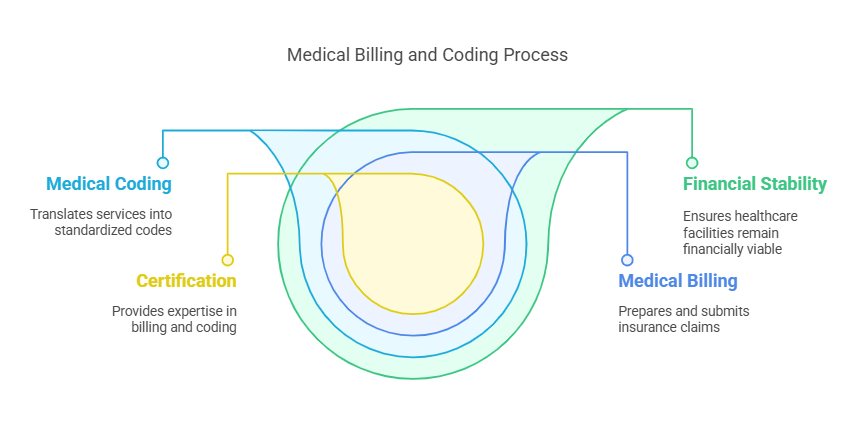Essential Guide to Billing and Coding for Dummies
Medical billing and coding play a crucial role in the healthcare industry, ensuring that medical services are accurately documented and billed. Whether you're new to the field or looking to refine your skills, understanding the fundamentals of these processes is essential. This guide simplifies the basics, helping you grasp how insurance claims are processed and how medical services are converted into standardized codes. With proper training and certification, you can establish a successful career in this essential sector.

Understanding Medical Billing and Coding
Medical billing and coding are interconnected processes that ensure healthcare providers receive accurate compensation for their services. Medical billing and coding certification, such as the one offered by AMBCI, helps professionals gain expertise in these crucial tasks. Medical billing involves preparing and submitting insurance claims, ensuring that providers are reimbursed for medical procedures. This process begins with patient registration, verification of insurance details, and determination of financial responsibilities.
Medical coding, on the other hand, involves translating clinical services into standardized codes that insurance companies recognize. These codes—such as CPT, ICD-10, and HCPCS—are essential for accurate billing and record-keeping. Proper training ensures that medical coders can accurately classify diagnoses and procedures, reducing claim denials and ensuring proper payment.
Professionally trained coders play a crucial role in maintaining data accuracy and ensuring compliance with healthcare regulations. Without proper billing and coding, healthcare facilities would struggle with financial instability and inefficiencies in patient care.

Training and Certification Requirements
A career in medical billing and coding requires specialized training, which can be obtained through diploma programs, associate degrees, or certification courses. These training programs cover medical terminology, coding protocols, and compliance regulations.
Certifications, such as the Certified Professional Coder (CPC) by the AAPC, demonstrate expertise in medical coding standards. Passing this exam grants the CPC-A designation, which can be upgraded to full CPC status with relevant experience. Similarly, medical billing professionals can obtain the Certified Medical Reimbursement Specialist (CMRS) or Certified Professional Biller (CPB) certifications.
Continuing education is critical in this field, as coding standards and insurance regulations frequently change. Staying updated with the latest industry standards ensures job security and enhances career opportunities.
Career Opportunities in Medical Billing and Coding
The demand for medical billing and coding professionals continues to grow, driven by the expanding healthcare industry. Job opportunities are available in hospitals, clinics, insurance companies, and healthcare consulting firms.
Common job titles in this field include:
Medical Coder
Medical Biller
Billing Specialist
Health Information Technician
Accounts Receivable Manager
Certified professionals often enjoy higher salaries and better job prospects. The integration of Electronic Health Records (EHR) has further increased the demand for skilled coders and billers who can efficiently handle digital documentation.

Ethical and Legal Considerations in Billing and Coding
Maintaining ethical and legal standards is crucial in medical billing and coding. Violations such as upcoding (billing for more expensive procedures), unbundling (charging separately for services that should be grouped), and undercoding (billing for fewer services than performed) can lead to legal consequences, financial penalties, and reputational damage.
Compliance with regulations such as the Health Insurance Portability and Accountability Act (HIPAA) ensures patient data privacy and security. Ethical billing practices contribute to a transparent healthcare system and prevent fraudulent activities that could harm patients and providers alike.
The Role of Technology in Medical Billing and Coding
Technology has transformed the medical billing and coding industry, improving accuracy and efficiency. Artificial Intelligence (AI) and machine learning now assist in claim processing, reducing errors and expediting reimbursements. These tools help coders by:
Automatically suggesting the most appropriate medical codes
Detecting fraudulent billing patterns
Reducing the time required for manual data entry
The integration of Electronic Health Records (EHRs) ensures seamless communication between healthcare providers and insurers, minimizing claim rejections. Keeping up with technological advancements is essential for professionals in this field.
Tips for Success in Medical Billing and Coding
To excel in medical billing and coding, professionals must focus on precision, continuous learning, and ethical integrity. Here are some key tips for success:
Stay Updated – Regularly review industry updates, coding changes, and regulatory guidelines.
Develop Attention to Detail – Accuracy is crucial for minimizing claim denials and financial losses.
Enhance Technical Skills – Learn to use billing software and EHR systems efficiently.
Obtain Certification – Certification enhances job prospects and demonstrates expertise.
Commit to Ethical Standards – Avoid fraudulent practices and ensure compliance with industry regulations.
By following these best practices, professionals can build a successful and rewarding career in medical billing and coding.

Six Lesser-Known Facts About Medical Billing and Coding
Medical coding began in the 17th century – The first recorded system of medical classification was introduced in England in 1662:
The London Bills of Mortality, introduced in 1665-1666 during the Great Plague of London, categorized deaths by cause using numerical codes, marking an early form of medical classification.
codingclarified.com
ICD codes are updated every year – The International Classification of Diseases (ICD) undergoes regular revisions to reflect new medical discoveries and treatments:
The World Health Organization periodically updates the ICD to incorporate the latest medical knowledge and classifications.
AI can now handle up to 70% of coding tasks – Advanced AI-driven software can automate large portions of medical coding, reducing human workload:
AI algorithms can reduce coding errors by automating the extraction and classification of medical data, potentially reducing manual coding tasks by up to 40%.
amplework.com
Billing errors contribute to 80% of claim denials – Simple mistakes, such as incorrect patient details or mismatched codes, cause the majority of insurance claim rejections:
Coding errors can lead to claim denials, delayed reimbursements, and potential legal consequences, highlighting the importance of accurate coding.
enfinitymedicalbilling.com
Medical coders play a role in disease research – Data collected from coded medical records helps researchers track disease trends and public health issues:
The systematic collection and coding of mortality data have historically aided in tracking disease patterns and public health trends.
hiacode.com
Some medical coders work remotely – Many billing and coding jobs allow professionals to work from home, making it a flexible career choice:
The integration of AI and automation in medical coding has improved efficiency, allowing for more flexible work arrangements, including remote positions.
combinehealth.ai
Frequently Asked Questions (FAQs)
-
AI and EHR integration streamline billing, reduce errors, and improve reimbursement accuracy, making healthcare operations more efficient.
-
Ethical issues include upcoding, unbundling, and undercoding, all of which can result in legal and financial consequences.
-
Salaries vary based on experience, location, and certification. In 2025, certified medical coders earn an average of $55,000 to $70,000 per year.
-
Certification is not always mandatory, but it significantly improves job prospects and earning potential.
-
Medical billing involves submitting insurance claims for reimbursement, while medical coding focuses on translating medical records into standardized codes.
Final Thoughts
Medical billing and coding are essential components of the healthcare system, ensuring accurate documentation and financial stability. As technology continues to advance, professionals in this field must stay updated with new tools, regulations, and industry standards. With the right training and certification, you can build a successful career in this growing industry.
